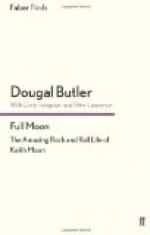It was at this stage that Thalassa was seized with an inclination to thrust himself into the dialogue. Striving to explain his reasons at that distance of time, he said it was Robert Turold’s last remark which really decided him—did the trick, as he phrased it. Actually it must have been a prompt recognition of the kinship between two lawless souls.
He left his seat and went across to where the two young Englishmen were earnestly talking, unaware that they had been overheard. He approached them as one shipwrecked sailor might approach two other castaways marooned on the same rock. They all wanted money, and they all wanted to get away from that God-forsaken hole. Diamonds they were after? Well, he could take them to a place at the other end of the world where there were enough diamonds in the rough to make them all rich for life.
After the first surprise at his interruption they heard him in silence, and then plied him with questions. Where were these diamonds? In a volcanic island in the South Pacific. Where about? They couldn’t expect him to tell them that. It was Robert Turold (Thalassa seemed to have addressed himself principally to him) who asked him how he knew that the diamonds were still there. Thalassa’s reply was that they were buried in a big box, and the island was out of the run of ships. What sort of a big box? Turold had asked. Thalassa replied (perhaps reluctantly) that the box was “a kind of a coffin,” and that there was a dead man inside of it as well as the diamonds, but he, at all events, was not likely to run off with them.
Remington and Turold were startled by this answer, and conferred hastily apart. They returned to ask more questions. They wanted to know how the body and the diamonds had got there in the first instance, but that was a story which Thalassa refused to reveal. That had nothing to do with it, he said. The ship which had buried the man there had gone down afterwards with all hands, so nobody knew about the diamonds except him.




